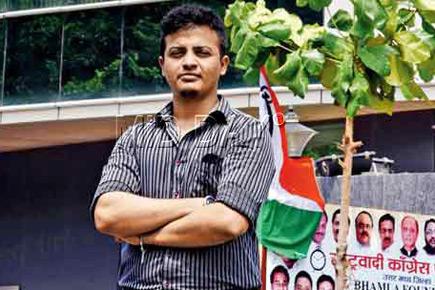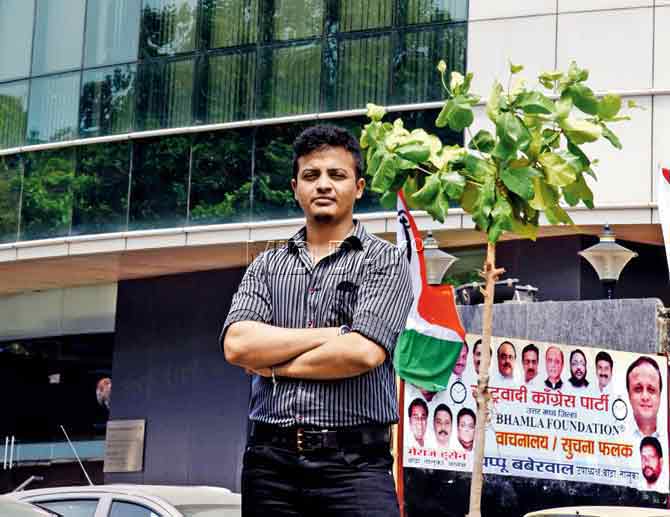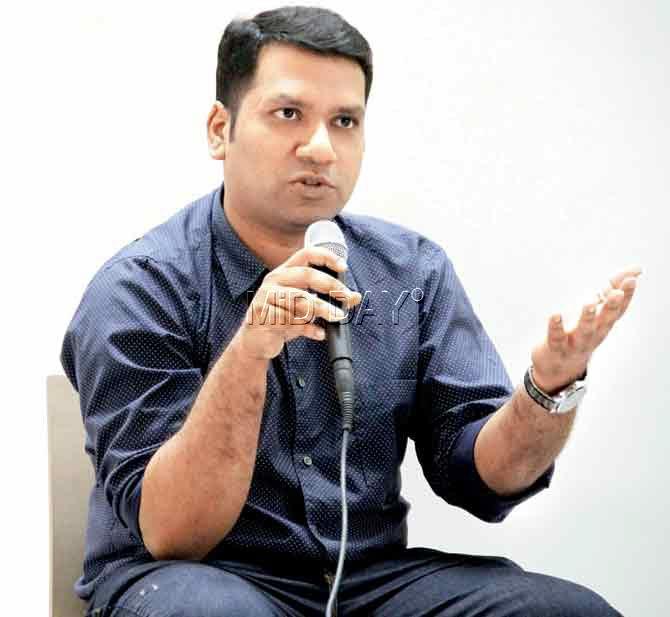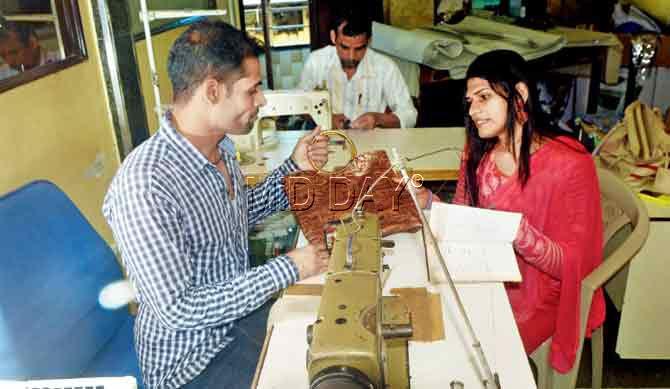The Constitution recognised the third gender last year, and many firms are already re-working their policies. But, the ride is yet to be smooth

Siddhant has been working as a recruitment consultant for the last 15 years. His clients and colleagues have seen him through his transitioning years.
At an office party some years ago, my female colleagues had put together a ramp-walk,” says Siddhant, who identifies by his first name only, “I was teased by my colleagues, who kept prodding me to join them. I just laughed along; they are like family.” Dressed smartly in a black shirt and khaki pants, with aviators to round-off the look, he could be mistaken for a young policeman. “I am not the stereotypical macho guy. I love to cook; I cry at times. I don’t think these make me less of a man,” says the 37-year-old, as he chivalrously offers to pay for coffee at the café we are at. It’s a good 10 blocks away from the recruitment firm of 12 staffers, in Bandra West, where he is employed.
ADVERTISEMENT

Siddhant has been working as a recruitment consultant for the last 15 years. His clients and colleagues have seen him through his transitioning years. Pic/Rane Ashish
Looking back at the 15 years that he has been working at the firm as recruitment consultant, Siddhant thinks he has been luckier than most. “When I underwent the first phase of my sex realignment surgery (SRS), I informed my boss. I was provided a loan and a month off for recovery. He even mailed my colleagues, explaining the situation and asked me to bear with them while they adjusted to addressing me as ‘he’ instead of ‘she’,” says Siddhant.
Born a girl, Siddhant knew since his primary school years that he was different. Wondering if he was a lesbian, it was only in 2007 that he learnt of the word ‘transsexual’. With a BCom in hand, he, like a few others, has managed to find his place within corporate India and works without discrimination. His story, however, isn’t shared by everyone.

Joe Zachariah, who leads a steering committee for diversity and inclusion at an MNC, spoke at a talk on LGBT inclusion at the workplace, organised by the Godrej Culture Lab on Friday. PIC/Godrej Culture lab
‘How will others react?’
In another larger Delhi-based recruitment consultancy firm, with branches in metros across the city, a transsexual candidate had applied for the job of recruitment officer at the Kolkata office last year. Having undergone an SRS after graduating from a boy’s college, the candidate was rejected. The CEO of the company explains, “We weren’t sure whether the workplace was mature enough to handle her. Will she be teased? Will there be discrimination? How will her colleagues accept her?” The candidate was turned down. The same CEO then spoke of how unfortunate it was that hijras were used by MNCs as collections executives to intimidate clients to pay-up.

Relentlessly upgrading her academic qualifications and professional experience, Sonalee Chaukekar works as a part-time accountant for two organisations and as full-time workshop coordinator at Manav Foundation, an NGO, where she supervises the production of handmade crafts items. Pic/Pradeep Dhivar
In the gender category, a tick-box with ‘other’ written against it in official documents and job application forms is not enough. Workplace homophobia is one thing; transphobia is its growing child. The term LGBT (Lesbian, Gay, Bisexual and Transgender) could be problematic in these cases since it lumps together orientations and gender identities. Your sexual orientation can be kept private, but your sex, with all its visible signs, is public. One solution will not fit all.
The most aggravated are middle-class transsexuals, like Siddhant (whose father worked as a turner at a mill in Byculla), with an education that prepares them for white-collar jobs but short of workplaces that will absorb them.
Advocate Tripti Tandon says, “The conglomeration — LGBT — is helpful to fight for the rights of these sexual minorities. But, when it comes to nuances and differences, it can cause more hurt than help.” Earlier this year, Tandon had represented Anamika Singh, a 26-year-old who now works as assistant manager at a public sector bank in Malabar Hill. Singh, who is known by her legal, masculine name at her workplace, was selected through the Institute of Banking Personnel Selection exam held in October 2014.
“I had travelled from Delhi for the interview in January. I had applied as a male candidate and when I told my prospective employers that I was planning to undergo hormone replacement therapy (HRT), my honesty backfired,” says Singh. Singh was shunted around. It was only the threat of a lawsuit that brought an immediate hiring. “But I lost out on my training,” says the MBA graduate. And then, she flicks her hair, checks her reflection in her cellphone and says, “But I feel secure in a public sector bank. They can’t fire me without reasons. I worked towards this all my life.”
Navigating the everyday
Coinciding with Independence Day celebrations this year, a video uploaded by Yathartha Pictures on YouTube, showcased hijras singing the national anthem. The video starts with a blurb on last year’s Supreme Court ruling in the National Legal Services Authority (NALSA) judgement as helping hijras “follow their dream and pursue a career of their choice.” The hijra actors are dressed as flight attendant, cook and doctor. But, without actual policy frameworks, this could well be a fancy-dress for fanciful thoughts.
The biggest hurdle is with terminology and documents. The ‘third’ gender has its categories: A hijra is castrated; a transsexual has an SRT, while a transgender does not. Siddhant, for instance, does not use the term ‘third gender’. Identifying himself as male, he has changed both his name and gender in his election card. He had to approach a lawyer to effect similar changes in his PAN card. His passport has not been issued still. “When my PAN card gets changed, I will have to resign from my job and be appointed again. My boss feels this is the best way to overcome meaningless paperwork,” he says. Singh, on the other hand, is gearing up for the documents battle. Despite her designation at the workplace, she chooses not to have her masculine name on place-card on her desk. “Thankfully, my colleagues introduce me as a girl to our customers,” she says.
Joe Zachariah, who leads a steering committee for diversity and inclusion at an American multinational management consulting firm, says, “In the blue-collared world, hijras are accepted. In the white-collared world, lesbians and gays are better accepted than transsexuals.” It is always the softer aspects in workplaces — such as gender-specific toilets or a man who wants to dress like a woman — rather than big policies that need most consideration, he says. However, he cites how his previous workplace, another MNC, provides for up to 35 per cent coverage for SRS. The problem: There are no takers.
The hijra stereotype
Since discrimination occurs early on, it is hard to see transsexuals occupy positions of power. With few support groups in place, drop-out rates in colleges and schools are very high, says Pallav Patankar, director of Humsafar Trust’s HIV programme. He suggests a visit to Thailand, where, apart from its lady-boys, transgender women are often seen working in factories. “In India, if you are a pretty transsexual, you will be forced into sex-work. It is seen also as a way of staying away from the discriminatory eyes of colleagues,” he says. He also points at the stereotype of the hijra, connected with earning money through begging. “A hijra need not be poor. A hijra may have crores. The question is: Who will allow a hijra to buy a house with those crores?”
Sonalee Chaukekar works as a part-time accountant for two organisations — Dinesh Carriers and Hill Heavens Cooperative Society — and as a full-time workshops coordinator at Manav Foundation, an NGO in Grant Road. The 21-year-old identifies herself as a hijra — different from transsexuals. She has a hijra guru and also makes donations to the community. Through her high- school years and later, during her BCom, Chaukekar has amassed the following: typing certificates, an MSc IT as well as a Tally course. Having once worked as a compounder and peon, she is intent on getting employed as a full-time accountant. This, she feels, is not in conflict with her identity.
“Being professional goes a long way. No one has ever been prejudiced against me at any workplace,” she says. There is one thing that comes in her way though — the fear of interacting with men who make suggestive remarks.
“It is important to define what non-discrimination is. Most often, colleagues are confused about what they can and cannot ask a transsexual. Orientation and sensitisation programmes, a support structure and a career graph will help transsexual employees feel comfortable,” says Patankar.
A career graph, however, is the least of Siddhant’s troubles. “I have struggled with myself for so long that I never had room to think of anything else.”
 Subscribe today by clicking the link and stay updated with the latest news!" Click here!
Subscribe today by clicking the link and stay updated with the latest news!" Click here!








